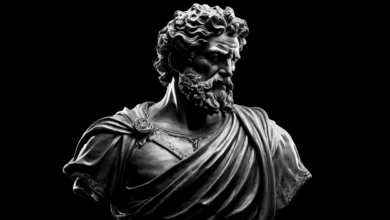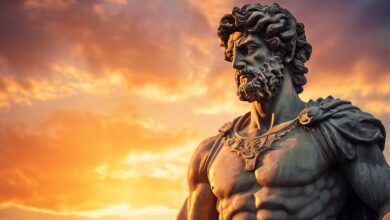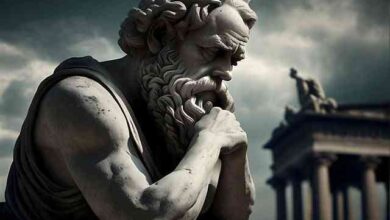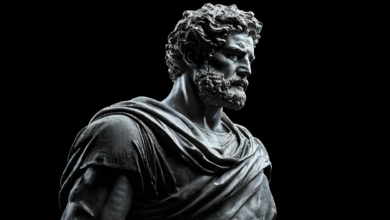Among the Ruins of Time The Stoic Legacy for a Fulfilling Life
Introduction
In a world where speed seems to be the only constant, where technology simultaneously connects and isolates us, and where the pursuit of happiness often turns into a frenetic race, the ancient wisdom of the Stoics emerges as a beacon of serenity.“Among the Ruins of Time: The Stoic Legacy for a Full Life” is a journey through the timeless principles of Stoicism, adapted for modern life.This is not just a narrative about philosophy; It is an invitation to personal transformation, an exploration of how we can find balance, purpose, and peace in the midst of chaos.
The Encounter with Stoic Philosophy
Lucas woke up to the shrill sound of his cell phone alarm, an unwelcome reminder that another day of work was beginning. The sun had barely risen over the horizon, but the city was already in motion. The noise of traffic, the hurried footsteps of pedestrians and the smell of freshly brewed coffee mixed in the air, creating an urban symphony that Lucas no longer noticed. He dragged himself out of bed, feeling the weight of his routine on his shoulders.
In the subway, squeezed between unfamiliar bodies, Lucas watched the lights flashing on the tunnel walls. He thought about how his life had become an endless sequence of identical days, where each morning was just a repetition of the previous one. Office work was steady but monotonous, and evenings were filled with TV series and social media, which offered a temporary escape from reality.
On one of those ordinary days, while walking to work, Lucas noticed a small bookstore he had never seen before. Its old facade, with peeling gold letters, contrasted with the modern shops around it. A sudden curiosity led him to go inside. The interior was welcoming, with wooden bookshelves that smelled of old books. As she browsed the shelves, a title caught her eye: “The Art of Living: Stoic Lessons for Modern Living.” The bookseller, a wise-looking gentleman with bright eyes, noticed her interest. “An excellent choice,” he said with a smile. “The Stoics have much to teach us about how to live well, even in difficult times.” Luke, intrigued, bought the book and decided he would read it that very night.
Back at his apartment, Luke opened the book and began to read. The words of the ancient philosophers resonated within him, as if they had been written specifically for his situation. Seneca spoke of the brevity of life and the importance of living in the present. Epictetus taught about the distinction between what we can and cannot control. Marcus Aurelius shared insights on inner discipline and the pursuit of virtue.
Lucas felt a deep connection to these ideas.For the first time in a long time, he felt like he had found something that could really make a difference in his life.The Stoic lessons seemed to offer an alternative to the dissatisfaction he felt, a way to find meaning and purpose in the midst of the routine.
That night, Lucas fell asleep with the book beside his bed, eager to continue reading the next day. He didn’t know it yet, but this chance encounter with Stoic philosophy would mark the beginning of a transformative journey.
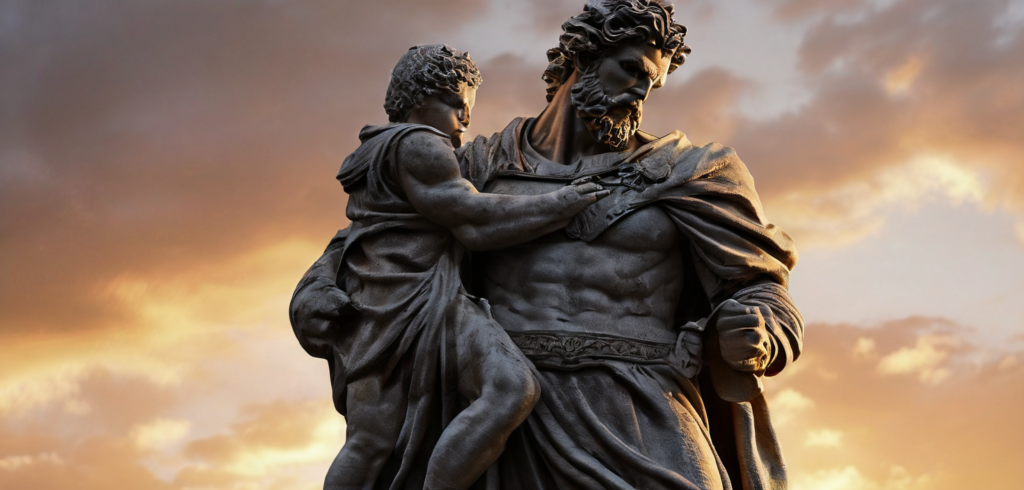
Seneca’s Wisdom – Time is Our Greatest Wealth
The morning sun streamed through the window, illuminating the room with a soft light. Lucas woke up with a different feeling, a kind of anticipation he hadn’t felt in years. Seneca’s book lay open on his bedside table, reminding him of what he had read the night before. He arose with new vigor, determined to apply the Stoic lessons to his life.
On his way to work, Lucas pondered the idea that time is our greatest wealth. Seneca argued that while we cannot control the length of our lives, we can control their width and depth. Luke realized that he had been treating his time as infinite, wasting it on meaningless activities. He decided that he would begin to value each moment, to live more intentionally. At his office, instead of being distracted by his usual distractions, Luke focused on his tasks. He established clear priorities and worked more efficiently. By the end of the day, he felt a satisfaction he had not experienced in a long time. The sense of accomplishment was real, and he knew it was due to his changed approach. In the evening, Luke continued reading. Seneca also spoke of the importance of enjoying the present, of not worrying excessively about the future or regretting the past. Luke recognized that he often got lost in thoughts of what might have been or what might be, rather than appreciating what was. He decided he would practice mindfulness, living fully in the moment.
He began to notice little things that had previously gone unnoticed: the aroma of coffee in the morning, the smile of a colleague, the sound of rain tapping against the window. These small joys, previously invisible, now filled his day with meaning. Lucas felt like he was beginning to truly live, rather than just exist.
Epictetus and the Power of Perspective
As the days passed, Lucas delved deeper into the world of Stoicism. Epictetus’s book proved to be an inexhaustible source of insights. The central idea that it is not the events themselves that disturb us, but rather our perception of them, resonated deeply with Luke. He realized that he had often overreacted to situations that, in retrospect, were not as serious as they seemed. At work, Luke began to apply this lesson. When a classmate criticized him unfairly, instead of responding angrily, he remembered the words of Epictetus: “It’s not what happens to you, but how you react that matters.” Luke took a deep breath, remained calm, and responded rationally. The situation was resolved without unnecessary conflict, and he felt proud of his reaction. At home, Luke also noticed changes. Small irritations, like a noisy neighbor or slow traffic, no longer affected him as much as they used to. He learned to accept the things he couldn’t change and to focus his energy on the things he could control.This new perspective brought him an inner peace he didn’t know was possible.
Lucas began to see the world differently. Instead of focusing on the negative aspects, he began to look for the good side of situations.This change in perspective not only improved his mood, it also strengthened his relationships. People around him noticed the difference, and Luke felt more connected and appreciated.
Marcus Aurelius and the Art of Self-Discipline
As Luke read on, Marcus Aurelius’s words resonated with him deeply. Inner discipline, the pursuit of personal excellence, and building strong character were themes that resonated with his own aspirations. Luke realized that in order to live by Stoic principles, he needed to cultivate self-discipline.
He began to establish healthy routines. He woke up early to meditate and exercise. He organized his day with to-do lists and set clear goals. The discipline he applied to his daily life was reflected in his work. Lucas became more productive and efficient, and his colleagues noticed his change in attitude.
His self-discipline also manifested itself in his eating and sleeping habits. Lucas began to take better care of himself, recognizing that a healthy body was essential to a healthy mind. He discovered that discipline was not a restriction but a liberation. By controlling his impulses, he felt freer to focus on what really mattered. Marcus Aurelius taught that discipline was an art form, a continual practice of self-improvement. Luke adopted this view, seeing each day as an opportunity to grow and improve. He felt more confident and fulfilled, knowing that he was in control of his own life.
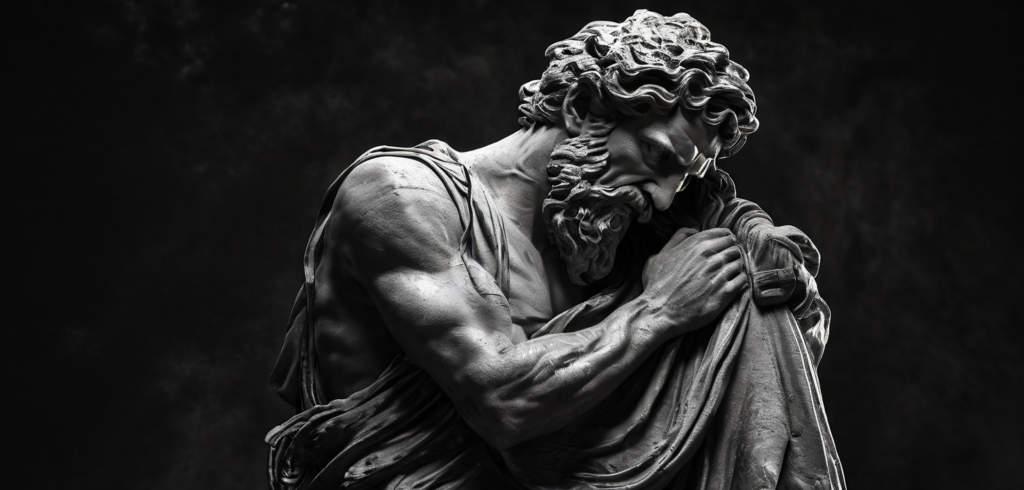
Acceptance of Impermanence
As Luke delved deeper into Stoicism, he was confronted with the reality of impermanence. Epictetus’ words about accepting change as the only constant in life made him reflect on his own existence. Luke realized that much of his distress stemmed from fear of change and uncertainty about the future.
He began to practice acceptance. Instead of resisting change, he began to embrace it as an opportunity for growth. This new approach brought him a sense of peace. Lucas felt lighter, less anxious. Acceptance allowed him to live with more ease and gratitude. Lucas also learned to appreciate the present, to value each moment as unique and precious. He realized that life is made up of moments, and that each one is a gift. This awareness gave him a new perspective, a different way of seeing the world. Acceptance of impermanence did not mean resignation or apathy. On the contrary, Luke felt more motivated to live life to the fullest, to seize every opportunity. He discovered that by embracing change, he could face challenges with greater resilience and courage.
Virtue as the Path to Happiness
As Luke applied Stoic principles to his life, he realized that virtue was the key to a happy life. The words of Seneca, Epictetus, and Marcus Aurelius on the importance of integrity, justice, courage, and wisdom resonated deeply with him. Luke recognized that acting virtuously was not only morally right, but also essential to personal fulfillment. He began to practice virtue in his daily life. At work, he strove to be fair and honest in his interactions. With friends and family, he became more compassionate and empathetic. Luke also worked to develop his courage by facing his fears and taking calculated risks.
As Luke lived according to virtue, he felt more fulfilled and happy.The happiness he experienced was not a shallow happiness, but a deep, lasting satisfaction.He realized that virtue was the foundation of a full and meaningful life.
Luke also noticed that virtue strengthened his relationships.The people around him felt closer and more appreciated. Virtue was contagious, and Luke found himself inspiring others to live more virtuously.
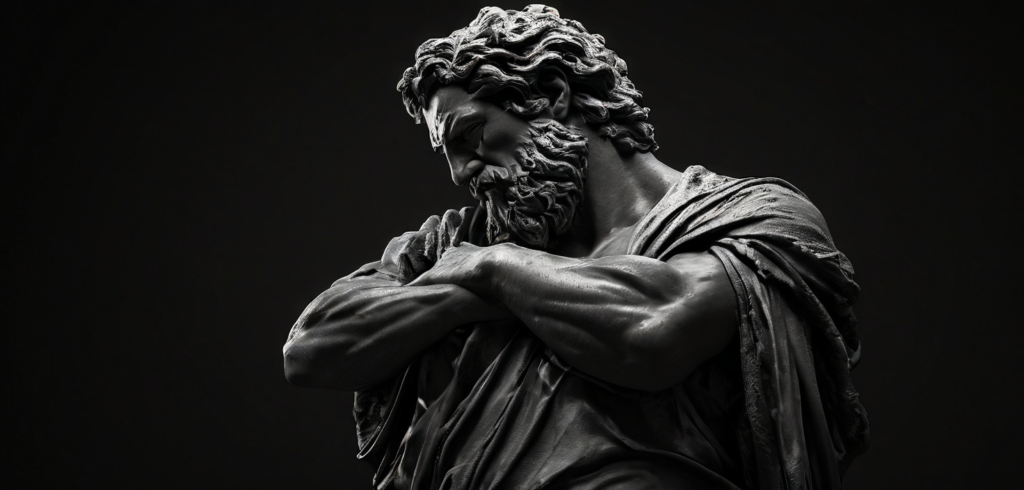
Stoicism in Everyday Life
Lucas began to apply Stoic principles to his daily life. He learned to cope with stress at work, to cultivate deeper relationships, and to find satisfaction in the little things. Stoicism became an integral part of his life, a practical philosophy that guided his actions and decisions.
At work, Lucas approached challenges with calm and rationality. He stayed focused on his goals and priorities, avoiding distractions and distractions. The discipline he applied to his daily life was reflected in his work. Lucas became more productive and efficient, and his coworkers noticed his change in attitude.
At home, Lucas also noticed changes.Little irritations, like a noisy neighbor or slow-moving traffic, no longer affected him as they had before.He learned to accept the things he couldn’t change and to focus his energy on the things he could control.This new perspective brought him an inner peace he didn’t know was possible.
Lucas began to see the world differently. Instead of focusing on the negative aspects, he began to look for the bright side of situations. This shift in perspective not only improved his mood, it also strengthened his relationships.The people around him noticed the difference, and Lucas felt more connected and appreciated.
Resilience in Adversity
Lucas faced personal challenges that tested his faith in Stoic philosophy. He had lost a loved one, faced health challenges, and faced financial hardship. But instead of giving in to despair, Lucas remembered the Stoic lessons of resilience. He learned to accept adversity as a part of life. Instead of resisting suffering, he embraced it as an opportunity for growth. Lucas discovered that by facing his challenges with courage and determination, he could turn them into sources of strength and wisdom. The resilience that Lucas developed allowed him to overcome obstacles and emerge stronger. He realized that adversity was an inevitable part of life, but that it did not have to define him. Resilience was a choice, a way of living that could be cultivated and practiced. Lucas also learned to appreciate the little things, to appreciate the moments of joy and beauty that still existed in his life. He discovered that resilience was not just about enduring suffering, but also about finding hope and meaning in the midst of adversity.
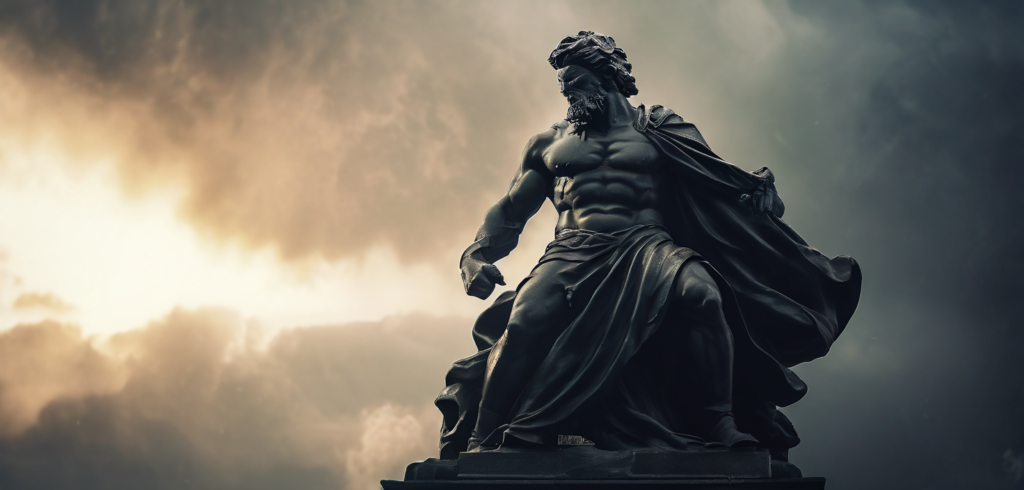
Community and a Sense of Purpose
Lucas discovered that true happiness was also linked to serving others and contributing to the community. He began to volunteer, helping those who were in vulnerable situations. This experience enriched his life in ways he had not expected.
Lucas felt more connected and fulfilled. He realized that by helping others, he was also helping himself. The community became a source of inspiration and purpose. Lucas discovered that a sense of purpose was an essential part of a fulfilling life.
He also realized that community was an important part of Stoic philosophy.The Stoics believed that we were all part of a global community, and that we had a duty to contribute to the common good.Lucas was inspired by this insight, and decided that he would live by these principles.
As Luke applied Stoic principles to his life, he realized that community was an essential part of a fulfilling life. He discovered that true happiness was also linked to service to others and contribution to the community. He began to volunteer, helping those in vulnerable situations. This experience enriched his life in ways he had not expected. Lucas felt more connected and fulfilled. He realized that by helping others, he was also helping himself.The community became a source of inspiration and purpose. Luke discovered that a sense of purpose was an essential part of a fulfilling life.
He also realized that community was an important part of Stoic philosophy.The Stoics believed that we were all part of a global community, and that we had a duty to contribute to the common good. Luke was inspired by this insight, and he decided that he would live by these principles.
As Luke applied Stoic principles to his life, he realized that community was an essential part of a fulfilling life. He discovered that by connecting with others and working together toward a common goal, he could find a sense of purpose that went beyond himself. This connection to community brought him a new dimension of meaning and fulfillment.
Lucas began organizing regular meetings with friends and colleagues to discuss philosophy and share experiences.These meetings became a safe space for reflection and personal growth. Lucas felt part of something larger, a community of people who were seeking wisdom and virtue.
He also began writing about his experiences and insights, sharing his reflections on a blog. Luke hoped that his words could inspire others to seek Stoic wisdom and find their own path to personal fulfillment. Writing became a form of expression and a means of connecting with a wider audience.
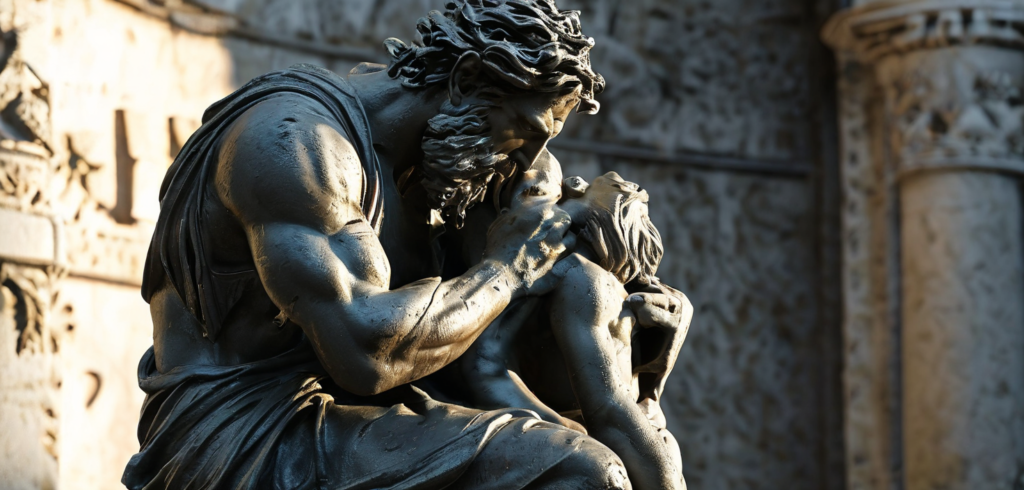
Personal Legacy and the Art of Living
In the final chapter, Luke reflects on his journey and the legacy he wants to leave. He realizes that the art of living is not a destination, but an ongoing process of learning and growth. Luke recognizes that although he has made significant progress, there is still much to learn and discover.
He reflects on the lessons he has learned from the Stoics and how they have transformed his life. Lucas is grateful to have encountered this philosophy and to have had the courage to apply it to his daily life. He knows that the journey does not end here, but that it is only the beginning of a new phase. Lucas decides that he wants to leave a positive legacy that will inspire others to seek wisdom and virtue. He wants to share his story and his experiences in the hope that they can help others on their own journey. Lucas believes that everyone has the potential to live a full and meaningful life, and that Stoic philosophy can be a powerful tool to achieve this goal.
He begins writing a book, sharing his reflections and insights on the art of living. Lucas hopes that his book can serve as a guide for those seeking a more balanced, meaningful and resilient life.He believes that by sharing his journey, he can help others find their own path.
Luke also decides to continue to participate in the community, to contribute to the common good, and to live according to Stoic principles.He knows that the art of living is an ongoing practice, and that each day is an opportunity to grow and improve.
Conclusion
“Among the Ruins of Time” culminates with Luke transformed, not only in his outlook, but in his way of living. He becomes a living example of how Stoic principles can be applied to create a more fulfilling, meaningful, and resilient life.The story ends on a note of hope, encouraging readers to embark on their own journey of self-discovery and wisdom.
Luke realizes that the art of living is an ongoing journey, a lifelong quest for wisdom and virtue. He is grateful for having encountered this philosophy and for having the courage to apply it to his daily life. Luke knows that there is still much to learn, but he is confident that he is on the right path.
Luke’s story is a testament to the transformative power of Stoic philosophy.It is a story of self-discovery, growth, and personal fulfillment.It is a story that inspires hope and encourages readers to seek wisdom and virtue in their own lives.
Tags: philosophy, stoicism, art of living, resilience, happiness, ancient wisdom, modern life, self-discovery, purpose, legacy
